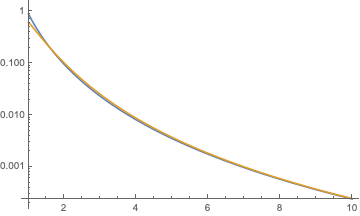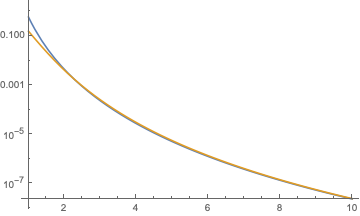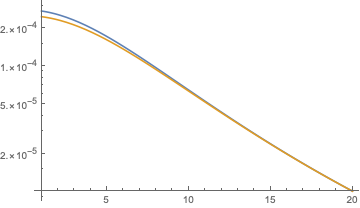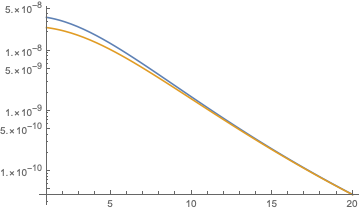I have to estimate the integral $$\int_{-\infty}^\infty \frac{e^{-y^2/2}}{((y+y_0)^2+x_0^2)^r} dy,$$ for $r\in \mathbb{R}^+$. I am a little amazed that Sage and Wolfram Alpha have nothing to say about it, and that Gradshteyn-Ryzhik doesn't seem to have anything on it either; it feels like a rather natural integral, the denominator being a distance function.
Of course I realize that, if I just expand $1/((y+y_0)^2+x_0^2)^r$ into a Taylor series around $y=-y_0$ and integrate term-by-term, I am not going to get something convergent; what I get is an asymptotic formula. But what is the right order of magnitude of the error term when the formula gets cut off at the $k$th term?
For instance: let $f(y)=1/((y+y_0)^2+(x_0^2))^r$ and write $$f(y) = f(y_0) + \frac{(y-y_0)^2}{2} O^*(\max_t f''(t)).$$ Then we get an error term of size $O(1/x_0^{2 r + 3})$. If we go up to a higher-order approximation, we obtain an error term of the form $O(1/x_0^{2(r+k)+1})$ for higher $k$. But can one also give an error term that depends on $y_0$ and not just on $x_0$, and thus is better when $x_0$ is large and $y_0$ is much larger still?
Note: also asked on MSE.
Note 2: just to be clear - the easy estimate (obtained by a cheap version of Laplace) is $$\frac{\sqrt{2 \pi}}{(x_0^2+y_0^2)^r} + O^*\left(\frac{2 r \cdot \sqrt{2 \pi}}{e^{3/2} x_0^{2 r + 2}}\right).$$ That is fine if $x_0 \asymp y_0$, but we would like to do better than that in general, particularly in the tricky case $y_0\ggg x_0\ggg 1$. Here $O^*(\text{X})$ means "something of absolute value at most $X$".




